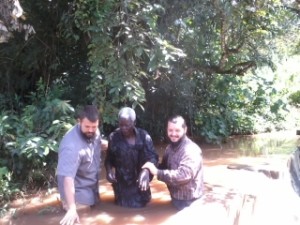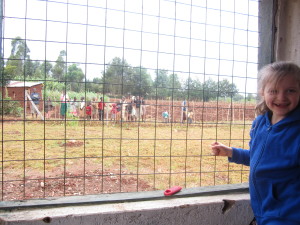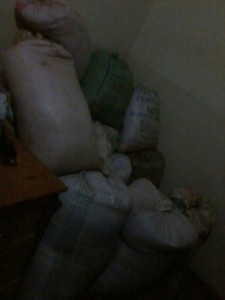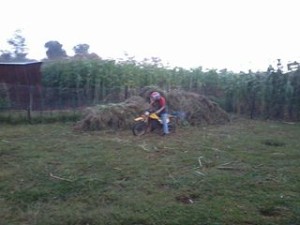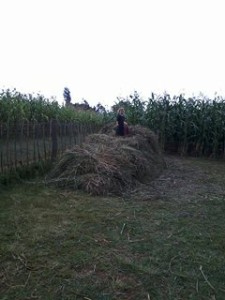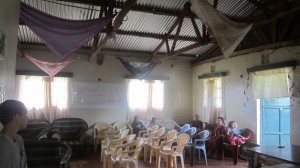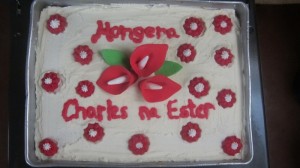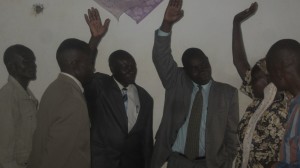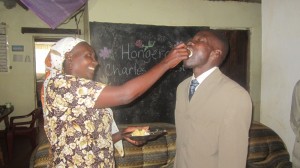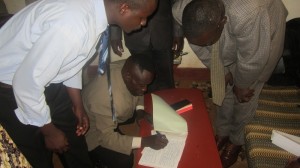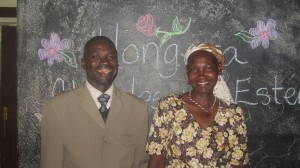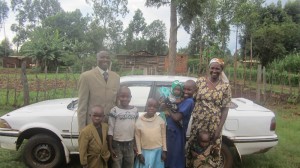On Sunday a small group met at our home for fellowship. We’re “supposed to” convene at 8 AM, since some folks still go to other church services later in the day but of course, THIS IS AFRICA. We finally got started at almost 9:00. Even so, our time together was a blessing.
We’ve tried to open our home for fellowship before, but at the time we were still the new wazungu in the community, so it was far from being true ekklesia–we attracted lots of folks interested in seeing us and our home, and having chai and something to eat. It didn’t take long before we abandoned that and started building relationships and focusing on disicpleship. We then began to meet with a very small group for a meal and mutual encouragement on Saturday evenings. That morphed into a more “open” service on Sunday morning, which includes committed followers of Christ as well as serious seekers (one of whom was baptized after meeting with Marc for most of last Sunday after our fellowship time).
This group, meeting now for a couple of months, has really been a blessing to us. Far from being the wazungu-centered gathering that it was initially, there is lots of interaction and participation. Our neighbor, Henry, pastor at a local church, usually opens us in prayer and filled in with a teaching a couple of weeks ago when Marc was away. Sam and Patrice offer a welcome, encourage testimonies and praise reports, and ask for prayer requests. They also share short teachings or encouragement from the Scriptures. One will share in Swahili, and the other translate into English. They do this pretty seamlessly now, whereas at first there was a lot of whispered communication and fumbling for “what next.” Florence is a gifted singer and almost always leads us in a song of worship at just the right times. All the children who come are learning to listen quietly and be respectful of our time together.
Our time of testimonies is a special blessing to me, as I love to hear what God is doing in folks’ lives. Last week, Ester, a relatively young believer who had been very sick over the previous week, shared a testimony that still makes me smile when I think of it. (You may remember that Charles and Ester were recently married at our house.) She said something like, “Last week satan was trying to push me down. I was sick and discouraged and I knew I needed to pray. Nobody taught me how to pray, but I learned! And now God has delivered me, and I feel like singing!” And she proceeded to lead us in a very exuberant song, with a beautiful smile and an absolute glow about her face. God is good!
After our fellowship time this week, Marc and I were slated to attend a baby dedication ceremony at the home of a neighbor, one I met through the Department of Public Health during our recent children’s clinic. We were told it would begin at 1:00, but then Rose (who was going with us) said it wasn’t “really” until 2:00. She was supposed to pick us up but by the start-time still hadn’t arrived and wasn’t answering her phone. We knew the location wasn’t far but weren’t exactly sure where we were going. Hating to be late, we decided to wing it and ask around. Fortunately, Silas was coming in just as we were going out and he commandeered a child escort to take us to our destination. (Silas has been drying his maize on our lawn and wanted to get it re-bagged before the afternoon rain, otherwise I’m sure he would have gone with us himself.)
So we arrived at the dedication on “African time,” which was great because we got to slip into some unobtrusive seats in the back row. (There were rows of narrow benches set under a tarp, which was just a bunch of burlap sacks sewed together.) But not for long. Once the organizers realized we had arrived, we got escorted right to the VIP seating in front. I understood about 1/4 of what the Master of Ceremonies was saying, which I thought was pretty good. The speeches were all peppered with a whole lot of Bwana asifiwe (“Praise the Lord”). About midway through the celebration, just as the baby (Simon Peter) made his appearance at the front (though “appearance” is a relative term, since he was abundantly swaddled in about three blankets), it started to rain. Hard. We were at the edge of the tent and needed to push our chairs in a little to avoid getting wet. However, there were holes in the burlap sacks and, though we tried to maneuver around them, there was no safe location. Eventually a big gusts of wind threatened the stability of the tent at various locations, so men scurried around with sticks and tried to prop it up. Others got more burlap sacks and tried to cover the audio equipment, as it was large enough of a gathering to require microphone and speaker.
It wasn’t long before everyone realized that we’d need to move indoors. Transporting a group that size, plus equipment and seating, in driving rain, was very interesting. About 120 of us stood crammed into a room approximately 14’x16′ feet, with a small path through which the benches were brought in and re-arranged. Somehow we fit enough in that everyone could sit down. Everyone was amazingly adaptable to the change in plans, the slight discomfort, and the fact that nearly all the guests were wet. There was even good humor about the few times that the host’s pigeons (also flying around inside due to the rain) perched atop some of the guests’ heads.
The dedication included prayers, gift-giving, lots of wimbo (song), and the interesting tradition of passing the little baby around, to be held by every guest in attendance. Marc tried to get a picture/video of this, as it was a very happy event with lots of singing, but unfortunately there was no lighting in the house (save what came in through the open door), so photo ops were limited.
Most were excused after the formalities, but the “VIPs” stayed behind in the house. With just a bit more re-arranging of furniture, we were served chai, rice (from a 5-gallon pail) and beans, mandazi and chapati.
The walk home was fun, as many locations in our narrow path had been flooded out, but we were just in time for dinner. Thankfully, I had made a small batch of granola earlier in the day (intended for the next day’s breakfast), but it and some bananas made a good supper, since I didn’t really have time to prepare much else.
After a day like this Sunday, we can’t help but be thankful for the continually developing relationships within our community, and for what God is doing. Bwana asifiwe!
